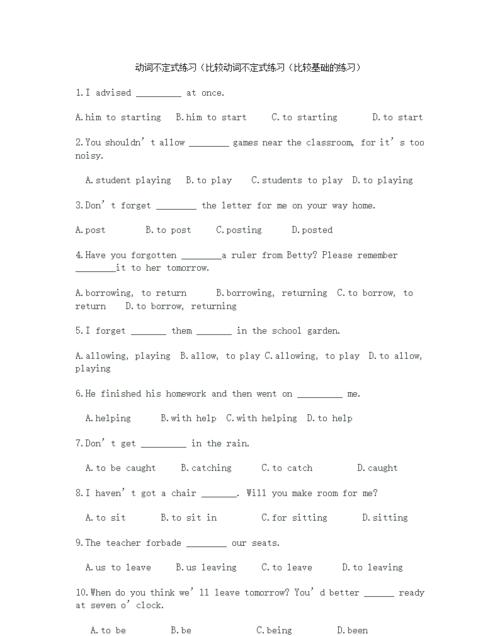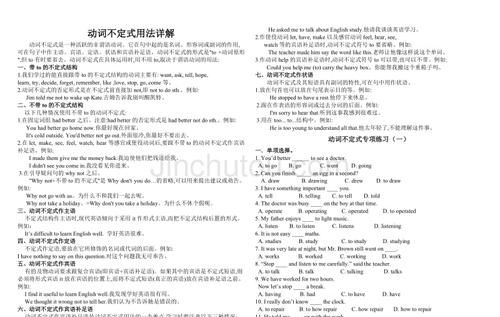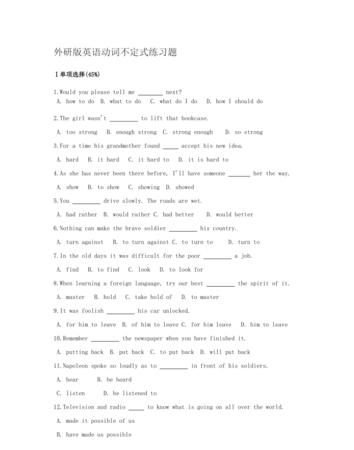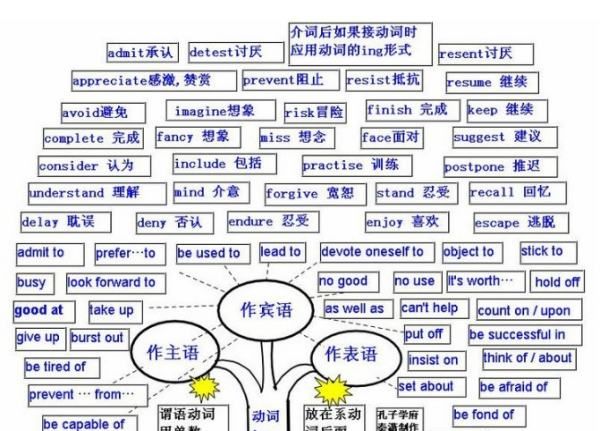本文目录
初一动词不定式大全表
动词不定式:(to) do,具有名词、形容词、副词的特征.
否定式:not (to) do
(1)一般式:不定式的一般式所表示的动作与谓语动词动作同时发 生或发生在谓语动词动作之后.
例如: I'm glad to meet you.
He seems to know a lot.
We plan to pay a visit.
He wants to be an artist.
The patient asked to be operated on at once.
The teacher ordered the work to be done.
(2)进行式:不定式的进行式所表示的动作与谓语动词动作同时发 生,
例如: The boy pretended to be working hard.
He seems to be reading in his room.
(3)完成式:不定式的完成式表示的动作发生在谓语动词动作之 前,
例如: I regretted to have told a lie.
I happened to have seen the film.
He is pleased to have met his friend.
2.不定式的句法功能:
(1)作主语: To finish the work in ten minutes is very hard.
To lose your heart means failure.
动词不定式短语作主语时,常用it作形式主语,真正的主语不定式置 于句后,例如上面两句可用如下形式:
It is very hard to finish the work in ten minutes.
It means failure to lose your heart.
常用句式有:
1、It be 名词 to do。
2、It takes sb. some time to do。
3、It be 形容词 of sb to do。
4、It be 形容词 for sb. to do。
常用 careless,,clever,good,foolish,honest,kind,lazy,nice,right,silly,stupid,wise, 等表示赞扬或批评的形容词,不定式前的sb.可作其逻辑主语。
(2)作表语: Her job is to clean the hall.
He appears to have caught a cold.
(3)作宾语: 常与不定式做宾语连用的动词有:want, hope, wish, offer, fail, plan, learn, pretend, refuse, manage, help, agree, promise, prefer,
如 果不定式(宾语)后面有宾语补足语,则用it作形式宾语,真正的宾语 (不定式)后置,放在宾语补足语后面,
例如: Marx found it important to study the situation in Russia.
动词不定式也可充当介词宾语,如: I have no choice but to stay here.
He did nothing last Sunday but repair his bike.
动词不定式前有时可与疑问词连用,如: He gave us some advice on how to learn English .
(4)作宾语补足语: 在复合宾语中,动词不定式可充当宾语补足语, 如下动词常跟这种复合宾语:want, wish, ask, tell, or der, beg, permit, help, advise, persuade, allow, prep are, cause, force, call on, wait for, invite.
此外,介词有时也与这种复合宾语连用,如: With a lot of work to do, he didn't go to the cine ma.
有些动词如make, let, see, watch, hear, feel, have 等与不带有to的不定式连用,但改为被动语态时,不定式要加to, 如: I saw him cross the road. He was seen to cross the road.
(5)作定语: 动词不定式作定语,放在所修饰的名词或代词后 。与所修饰名词有如下关系:
①动宾关系: I have a meeting to attend.
注意:不定式为不及物动词时,所修饰的名词如 果是地点、工具等,应有必要的介词,如: He found a good house to live in.
The child has nothing to worry about.
What did you open it with?
如果不定式修饰time, place, way,可以省略介词 :
He has no place to live.
This is the best way to work out this problem.
如果不定式所修饰名词是不定式动作承受者,不 定式可用主动式也可用被动式: Have you got anything to send?
Have you got anything to be sent?
②说明所修饰名词的内容:
We have made a plan to finish the work.
③被修饰名词是不定式逻辑主语:
He is the first to get here.
(6)作状语:
①表目的: He worked day and night to get the money.
She sold her hair to buy the watch chain.
注意不定式放句首时,逻辑主语与句子主语要一 致:
wrong:To save money, every means has been tried.
right:To save money, he has tried every means.
wrong:To learn English well, a dictionary is ne eded.
right:To learn English well, he needs a dictiona ry.
②表结果(往往是与预期愿望相反的结果):
He arrived late only to find the train had gone.
I visited him only to find him out.
③表原因: They were very sad to hear the news.
④表程度: It's too dark for us to see anything.
The question is simple for him to answer.
(7)作独立成分:
To tell you the truth, I don't like the way he talk ed.
(8)不定式的省略:保留to省略do动词。
If you don't want to do it, you don't need to.
(9)不定式的并列:第二个不定式可省略to。
He wished to study medicine and become a doc tor.

初中动词不定式讲解思维导图
一、作主语,可以用it代替,it叫形式主语,动词不定式放在后面叫真正主语
1.To learn a foreign language is not easy.
It is not easy to learn a foreign language.
2. It’s dangerous to drive very fast.
二、作表语
My idea is to ring him up at once. 我的想法是马上给他打电话。
如果主语部分含实义动词do,且作表语的动词又是“do”的内容,这时表语不定式的“to”可以省略。如:All I did was wait here. 我能做的就是在这里等。
三、常可接动词不定式作宾语的动词有:agree(同意), hope(希望), decide(决定), need(需要), mean(打算), wish(希望), fail(失败), want(想要), begin(开始), would like(想要)等。
He has decided to go to the countryside. 他已决心去乡下。
四、“疑问词 + 动词不定式”结构可以作动词know、think、find out等的宾语。
I don’t know who to ask. 我真不知道该问谁。
五、“疑问词 + 动词不定式”可以作动词show、teach、ask等后面的直接宾语。
She told me where to find the earphone. 她告诉我什么地方可以找到耳机。
六、如果宾语太长,可用it作形式宾语,构成“主语 + 谓语 + it + 宾语不足语(名词或形容词) + to do sth”结构,谓语动词常为find、think、feel等。
I found it difficult to stop him. 我发现拦截他很困难。
七、动词不定式可以作介词的宾语。
Autumn harvest is about to start. 秋收即将开始。
I’m worrying about what to do next. 我正愁下一步该怎么办。
八、作定语的动词不定式与被修饰词有动宾关系。
I have a lot of books to read. 我有许多书要读。
此时,如果动词不定式动词为不及物动词,后面的介词绝对不能省略。
We had only a cold room to live in. 我们只有寒室一间。
九、作定语的动词不定式与被修饰词有主谓关系。
He is always the first to come and the last to leave. 他总是第一个到,最后一个走。
十、作定语的动词不定式与被修饰词之间只有修饰关系。
We have no time to go to town today. 今天我们没有时间去城里。
十一、作状语的动词不定式常表示目的、原因、方向、结果等。
I’m glad to meet you. 见到你,我很高兴。
They ran over to welcome the foreign guests. 他们跑过来欢迎外宾。
十二、不定式复合结构“for sb to do sth”可用作主语、表语、定语、状语等。
It’s for her to decide. 这得由她来决定。(表语)
There are many books for you to read. 这有许多书供你阅读。(定语)
The book ids too difficult for children to read. 这本书太难了,孩子们看不懂。(结果状语)
不定式复合结构作主语时,需注意:
It’s + 形容词 + for / of + sb + to do sth.
当上面的形容词指的是to do sth的性质时,用介词for。
It’s dangerous for children to swim in the river. 孩子在这条河里游泳很危险。(游泳这件事情危险)
当上面的形容词指的是sb的性质时,用介词of。这些形容词往往修饰人:good, bad, polite, unkind, kind, nice, clever, right, wrong, careful, careless
It was careless of you to do that. 你这么做真粗心。(你这个人粗心)
十三、动词hear, see, feel, watch, notice, look at, listen to等后面的动词不定式作宾语补足语时不能带to, 即常见的形式为: hear sb do sth等
Many people like to watch others play games. 许多人喜欢看别人玩游戏.
十四、let, make, have后面的动词不定式作宾语补足语, 也不能带to; help后面的动词不定式作宾语补足语, to可有可无
She let us meet her at the station, but she didn’t come. 她让我们去车站迎接她,卡她没有来.
十五、十三和十四这两种情况下的动词不定式在改被动语态句子时,必须将省略的to还原,也就是说,动词后需跟带to的动词不定式.
We heard him sing every day.
He was heard to sing every day. 那时每天都听到他唱歌.
十六、跟带to的动词不定式作宾语补足语的动词还有: ask, beg, leave, like, love, hate, prefer, order, teach, tell, believe, find, know, want, think, understand, would like等
形式为: ask sb to do sth
Would you like me to visit him? 要不要我拜访他?
I would prefer you not to come tomorrow. 我宁愿你明天不要来.
He ask the driver to stop the motobike. 他要那位司机拦下那辆摩托车.
十七、区别下列词组的不同含义:
①like to do sth
like doing sth
②stop to do sth
stop doing sth
③remember to do sth
remember doing sth
④forget to do sth
forget doing sth
十八、It takes sb some time to do sth.花费某人一段时间干某事.
It took me half an hour to do my homework yesterday.昨天我花了半小时做回家作业.
It took Jim an hour and a half to read the book.吉姆花了一个半小时看这本书.
It took mother one and a half hours to do the housework.母亲花了一个半小时干家务.
用汉字表述上面的句型为:It + take + 人 + 一段时间 + to do sth.
一段时间形式往往为像这样的例子:fifteen minutes15分钟,an hour一个小时, two days两天, half a month半个月,a year and a half一年半...等等
十九、不定式的特殊句型too…to…
①too…to 太…以至于…
He is too excited to speak.
他太激动了,说不出话来。
---- Can I help you ? 需要我帮忙吗?
---- Well, I'm afraid the box is too heavy for you to carry it, but thank you all the same. 不用了。这箱子太重,恐怕你搬不动。谢谢您。
②如在too前有否定词,则整个句子用否定词表达肯定, too 后那个词表达一种委婉含义,意 为"不太"。
It's never too late to mend. (谚语)
改过不嫌晚。
③当too 前面有only, all, but时,意思是:非常… 等于very。
I'm only too pleased to be able to help you. 我非常高兴能帮助你。
He was but too eager to get home. 他非常想回家。
二十、不定式的特殊句型Why not
"Why not +动词原形"表达向某人提出建议,翻译为:"为什么不……?" "干吗不……?"例如:
Why not take a holiday?
干吗不去度假?

初二英语动词不定式思维导图
1.I
___To
learn
a
foreign
language
well______(学好一门外语)is
not
easy.
2.It
is
good
___to
help
others________(帮助别人)when
they
are
in
trouble.
3.Li
Ming
asked
me
____to
go
swimming
with
him__________(和他去游泳)
4.You
must
be
hungry.I'll
get
you
something
__to
eat_______(吃)
5.Plese
tell
me
________how
to
read
the
wrod_______
(怎样念这个词)
6.She
didn’t
know
___what
to
say________(说什么)
7.Have
you
decided
___where
to
go________(去哪里)for
your
holiday?
8.Plese
remember
__to
close_______(关)the
window
before
you
leave.
9.We
are
so
glad
____to
hear______(hear)the
news.
10.I
don’t
know
where
__to
meet___(meet)
him.
11.I
let
him
___go___(go)
as
he
wanted
___to
meet___(meet)his
uncle
at
the
station.
12.It’s
difficult
for
the
boy
__to
swim____(swim)
across
the
river.
13.He
is
the
last
one
__to
leave______(leave)the
office
every
day.
14.The
boy
is
old
enough
_______(dress)himself.
15.She
is
too
ill
_______(go)to
school.
16.If
he
doesn’know
how
______(use)
the
recorder,you’d
better
_______(show)
him.
17.Will
you
please
help
me
_____(move)the
box.
18.It’s
better
______(put)
your
money
in
a
bank.
19.This
is
a
good
way
______(learn)English
well.
20.John
likes
_________(go)
the
cinema
once
a
week.
注意动词不定式!!!

动词不定式语法填空专项训练
This company was the first __IS__ portable radios as well as cassette tape recorders in the world. A. producing B. to produce C. having produced D. produced 2. The purpose of new technology is to make life easier, ____it more difficult. A .not making B. not make C .not to make D. nor to make 3. Helen had to shout ______above the sound of the music . A .making herself hear B. to make herself hear C. making herself heard D .to make herself heard 4. I don’t know whether you happen_______ ,but I am going to study in the U.S.A this September. A .to be heard. B. to be bearing C .to hear D .to have heard 5. The news reporters hurried to the airport, only ______the film stars had left. A .to tell B .to be told C .telling D .told 6. You were silly not _______your car. A. to lock B. to have locked C. locking D. having locked 7. The teacher asked us ______so much noise. A .don’t make B. not make C. not making D .not to make 8. An army spokesman stressed that all the soldiers had been ordered _____clear warnings before firing any shots. A .to issue B. being issued C. to have issued D. to be issued 9. I’d rather have a room of my own, however small it is, than_______ a room with someone else. A. to share B. to have shared C. share D. sharing 10. The bank is reported in the local newspaper_________ in broad daylight yesterday. A. robbed B. to have been robbed C. being robbed D. having been robbed 11. A number of paintings in the castle are believed ________in a fire. A. being destroyed B. having been destroyed C. to be destroyed D. to have been destroyed 12. The meeting _______ next week is sure to be a great success. A. to take place B. to be taken place C. to have taken place D. being taken place 13. As a result of my laziness, I failed ________ my work in time. A. and finished B. to finish C. and finishing D. to finished 14. I am sorry ______ written you a letter at the time. A. to have not B. to not have C. not to have D. not having 15. Will you lend him a magazine _________? A. to be read B. for reading C. to read D. he read 16. He could do nothing but _______for the bus _________. A. wait, to come B. wait; come C. waiting; coming D. waited; came 17 .It is a problem that doesn't need ________ right now. A. to solve B. solving C. being solved D. to be solving 18. There’s a man at the reception desk who seems very angry and I think he means _______ trouble. A. making B. to make C. to have made D. having made 19. I remember _______him _______the bike needed __________. A. hearing, saying, to repair B. to hear, say, to repair C. hearing, say, repairing D. to hear, saying, to be repaired 20. --- You should have thanked her before you left. --- I meant _________, but when I was leaving I couldn’t find her anywhere. A. to do B. to C. doing D. doing so 21. Robert is said to __________ abroad, but I don’t know what country he studied in. A. to have studied B. to study B. to be studying D. to have been studying 22. I’m going to Xi’an next week. Have you anything __________ to your parents? A. to take B. to be taken C. to be bought to D. to buy 23. When are they __________ in their plan? A. hand B. handed C. to hand D. give 24. In such dry weather, the flowers will have to be watered if they _____________. A. have survived B. are to survive C. would survived D. will survive 25. When we hurried to the station, there happened ________ no bus at that time. A. to have B. to be C. having D. being 26. I lost my way in complete darkness and, _________ matters worse, it began to rain. A. made B. having made C. making D. to make 27. At ________ time does the salesgirl get up late in the morning, though she is always too busy _________ a good rest. A. no, to take B. no, taking C. any, to take D. one, taking 28. --Are you a student? --No, but I used _________. A. to be B. to was C. to do D. to be a 29. I stopped to listen, and my son seemed _________ himself _________ in the living room. A. to enjoy, to shut B. to be enjoying, shutting C. to be enjoying, shut D. to have enjoyed, having shut 30. With a lot of difficult problems _________, the newly-elected president is having a hard time. A. settled B. settling C. to settle D. being settled 31. We’re leaving at six o’clock, and hope _________ most of the journey by lunch time. A. to do B. to have done C. to make D. to have made 32. The study of the wild world may help to make the world easier _________. A. understood B. to be understood C. to understand D. understand 33. Who will you get __________ the project for us? A. design B. to design C. designed D. designing 34. It is said in Australia there is more land than the government know __________. A. it what to do with B. what to do it with C. what to do with it D. to do what with it 35. We are not allowed __________ outdoors with some other children. A. playing B. to be playing C. to play D. be playing 36. Allen had to call a taxi because the box was _________ to carry all the way home. A. much too heavy B. too much heavy C. heavy too much D. too heavy much 37. She feels so strongly that each of us should have a role ____in making the earth a better place to live in. A. to have played B. to play C. to be played D. to be playing 38. When I handed the report to John, he said that George was the person _________. A. to send B. for sending it C. to send it to D. for sending it to 39. Do let your mother know all the truth, she appears _________ everything. A. to tell B. to be told C. to be telling D. to have been told 40. There are five pairs ___________, but I’m at a loss which to buy. A. to be chosen B. to choose from C. to choose D. for choosing 41. The problem is _________ difficult for us __________. A. so; work out B. very too; to be worked out C. rather too, to work out D. quite too, to work it out 42. ---Where should I _________ my application? ---The personnel office is the place __________. A. send; to send it B. send for; to send it to C. send for; for sending it D. send; to send it to 43. I’ve worked with children before, so I know what ___________ in my new job. A. expected B. to expect C. expects D. to be expecting 44. I feel it is your husband who ___________ for the spoiled child. A. is to blame B. is going to blame C. is to be blamed D. should blame 45. Can you imagine the questions I had __________ our teacher? A. asked B. to ask C. asking D. ask 46. Who did you _________ the wall yesterday? A. have painted B. have paint C. have to paint D. have painting 47. ---What’s the matter with John? ---He didn’t pass the test but he still ___________. A. hopes so B. hopes to C. hope it D. hope that 48. Much attention should be paid ____________ people’s living conditions. A. in improving B. to improve C. improving D. to improving 49. ___________ that evening was due to his ill health. A. He failed to come B. That he failed to coming C. His failure to come D. His failure in coming 50. I would love _______ to the party last night but I had to work extra hours to finish a report. A. to go B. to have gone C. going D. having gone 51. My family considers ________ a computer, which is considered ________ a great help in our work and study. A. to buy; to be B. buying; being C. to buy; being D. buying; to be 52. With the plane _________ in ten minutes, all the passengers on board were asked to turn off their mobile phones. A. taken off B. taking off C. to take off D. would take off 53. Thank you for all the trouble you’ve taken _________ me. A. to help B. with to help C. in helping D. of helping 54. He is believed ________ the college exam, for he is now studying very hard now. A. to pass B. to have passed C. pass D. that he can pass 55.--- Will you have anybody _________ the flowers? ---- Yes, I’ll have the flowers _________. A. plant, planted B. to plant, planted C. plant; to be planted D. to plant , plant 56. They are looking forward with hope________ from you soon. A. to hearing B. of hearing C. hearing D. to hear 57. Busy translating a book, he couldn’t help _________ the article. A. write B. writing C. wrote D. written 58. Zhou Lan doesn’t have to be made__________. She always studies very hard. A. learn B. to learn C. learning D. learned 59. ________this cake, you’ll need 2 eggs, 175 g sugar, and 175 g flour. A. Having made, B, Make C. To make D. Making 60. I feel it an honour _________ to speak here. A. to be asked B. to ask C. having asked D. asked 1---10 BCDDB BDACB 11---20 DABCC ABBCB 21---30 ABCBB DAACC 31-40 BCBCC ABCDB 41—50CDBAB BBDCB 51—60 DCAAA AABCA 在英语中不定式最常用于质词to之后, 例如在 to walk, to cry, to eat, to fear.这种用法叫做to-infinitive。莎士比亚在著作哈姆雷特的独白时就大量采用了这类不定式动词。 To be or not to be ... To sleep, perchance to dream ... 经常跟在to后形成不定式的动词包括:
例如: I arranged to stay the night. (我已安定好今晚留在这里。) We intend to go skiing this weekend. (我们打算这个周末去滑雪。) I swear to honour you. (我发誓为你增光。) He sought to notify them of this new occurrence. 这些有宾词,然后加上有to的不定式的动词包括 (连同以上带有星号的动词): advise, allow, challenge, command, compel, condemn, enable, encourage, expect, forbid, force, help, induce, inspire, instruct, invite, oblige, order, permit, persuade, prefer, program, remind, teach, tell, train, urge, warn.
有些动词之后加 for + 宾词 + to-然后不定式. 通常这些动词包含渴望的意思,不能单单在后面加上宾词和不定式 (though an infinitive alone may work). 这些动词包括 apply, arrange, ask, call, clamour, long, opt, plead, press, vote, wait, wish, yearn.
例如: I have arranged for the neighbour to water the plants. (“我已安排邻居浇水。”) I pleaded for him to accompany me to the theatre. (“我请求他陪我到戏院去。”) Infinitives in English exist in many aspects. Here is a table showing these different tenses for the verb to cook. 主动式 被动式 一般时 (to) cook (to) be cooked 进行时 (to) be cooking / 完成时 (to) have cooked (to) have been cooked 完成进行式 (to) have been cooking /

以上就是关于初二动词不定式专项训练 ,初一动词不定式大全表的全部内容,以及初二动词不定式专项训练 的相关内容,希望能够帮到您。

